- Latest articles
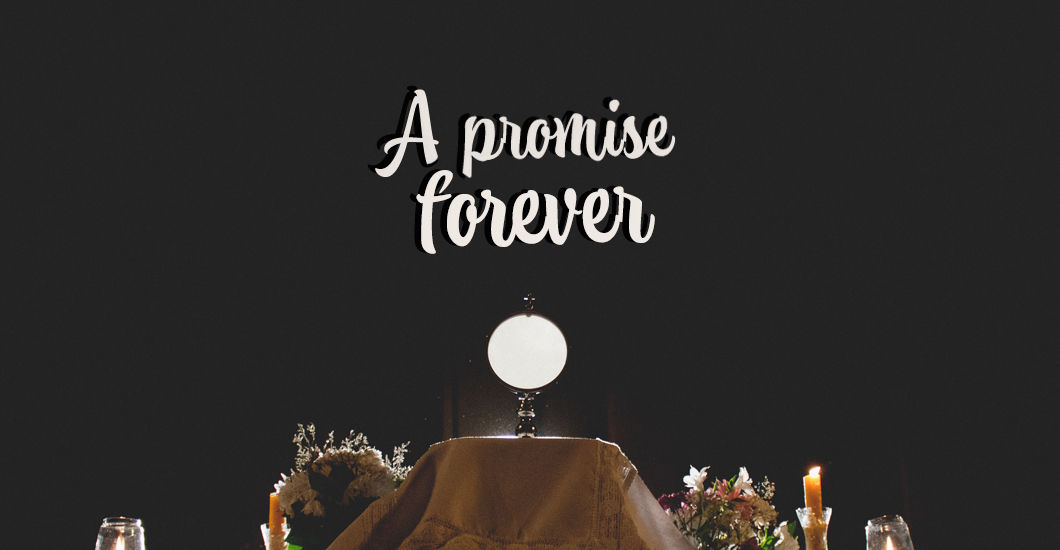
Christopher was waiting for his Dad to pick him up from church. He was brooding over what his Catechism teacher had taught about the Black Mass and satan worshippers who mistreated Jesus by mocking and desecrating the consecrated Eucharistic host. He had never even heard of a Black Mass before and felt sorry for Jesus.
In his innocence, Christopher tried to concoct a plan. Suddenly his attention was caught by a lizard which had self-amputated its tail and shed it in order to distract the predator, a brown spotted bird.
Christopher noticed that the severed tail was wiggling and spinning and the brown spotted bird, continuously picked at the tail without realizing that the lizard had actually fled.
Looking at this Christopher thought, ‘what if Jesus quit from the Blessed Sacrament?
What if Jesus was able to escape from the satan worshippers, just like the lizard? What if Jesus
could remove His presence in the Blessed Sacrament so He would not have to suffer? If Jesus quit, then the consecrated bread would just become ordinary bread. That way, satan worshippers, or those who participate in Black Mass, would not be able to humiliate Jesus.
Later that day, when his Dad came to pick him up, Christopher ecstatically detailed his new found plan for Jesus.
“Dad, why can’t Jesus just quit from the Blessed Sacrament? That way, he wouldn’t have to suffer, right?” Christopher asked.
For a moment, his Dad was silent. This was a bizarre question and his father had never thought about this before.
“My son, Jesus cannot leave the Blessed Sacrament because He is true to His word,” his father finally said. “The priest uses the words of Jesus when he blesses the Eucharist. When Jesus says: ‘This is my Body which is broken for you for the forgiveness of sins’, he has given a promise. He will never go back on His promise. So, for humankind, He will suffer any humiliation. Jesus suffered and gave up His life on Calvary to save mankind two thousand years ago. He is still suffering today.”
Do we realize how much Jesus is suffering in the Blessed Sacrament because of our sin, ignorance and lack of respect? Let us pray for the conversion of those who participate in Black Masses and all other sinners. Let us also pray that the whole of humankind will respect and love Jesus in the Blessed Sacrament.
'
The way to true success in less than 1000 words!
We are called to live a life of hope, peace and joy. Pope St. John Paul II once proclaimed that, “In a true sense, joy is the keynote of the Christian message. My wish is that the Christian message may bring joy to all who open their hearts to it… Faith is our source of joy.”
What would be your answer if you asked yourself, “Does my life proclaim a message of joy? Is my faith the source of my joy?
If we are honest, we would likely have to say that life circumstances often get in the way of living joyfully. And circumstances certainly have not been favourable recently – the pandemic has adversely affected each and every one of us.
Staying positive and hopeful can be difficult. Even more than the circumstances around us, there is something else that steals our joy: Ourselves. A prime source of unhappiness comes from our own negative thoughts and self-perceptions.
We are all children of God – precious and loved. But too often we forget this and define ourselves instead by worldly standards. One of those standards is success. We have probably been measuring ourselves with that measuring stick since our youth. We have been told repeatedly that we need to secure a good career, salary, marriage. And whatever you do, be good at it! That seems to be the resounding message–one that can leave us feeling inadequate.
We have been conditioned to judge by appearances. We commend people on their achievements, not on their efforts. It is the results that count, we are told. So we can easily overlook what truly matters.
The prophet Jeremiah was called by God to warn the people of Israel of impending judgement. But from his own words we know of his lack of success: “Who would listen to me if I spoke to them and warned them? They are stubborn and refuse to listen to your message; they laugh at what you tell me to say” (Jeremiah 6:10 GNT). The people refused to listen to Jeremiah and the leaders of Israel rejected him. The judgement that he prophesied came to pass and Israel suffered.
If we look at this through a worldly lens, all of Jeremiah’s work seems to amount to nothing. However, he showed remarkable faithfulness even in the face of immense opposition. He was obedient to God’s will and that was what made him a success.
Now, let us look at a modern-day example. St. Mother Teresa famously said, “God has not called me to be successful; He has called me to be faithful.” Can you imagine a more counter-cultural motto to live by?
I think most people would agree that Mother Teresa led a meaningful and admirable life. What made her life meaningful and admirable? Her words tell us why. Rather than trying to succeed in what she did, she simply did what God required of her. Her focus was not on herself, it was on God. This is evident in her remarkable kindness, and in the way she saw God especially in the weakest and poorest members of society.
The witness of Jeremiah and Mother Teresa lead us to an important insight: “The LORD does not look at the things people look at. People look at the outward appearance, but the LORD looks at the heart.” (1 Samuel 16:7).
So, let us not get overwhelmed and stressed trying to be successful according to the world’s standards. If we stay close to God and serve him wholeheartedly, he will bless our efforts. Nevertheless, being faithful to God comes with many challenges. It requires endurance and perseverance; but we know that it is a goal worth pursuing.
It can be tempting to compare ourselves to others and to strive for what the world considers success. But that leads to frustration and futility because there will always be those who are better, smarter, and more successful. However, there is a reassuring truth: The way the world sees us is not the way God sees us. God looks at our hearts. And ultimately God’s opinion is the only one that matters.
'
Are you anxious and worried about many things? Then this is for you!
I guess it was my week for meltdowns. As I tried to settle into my prayer time, my mind roared. For the second day in a row, I gave Jesus a rundown of all the health issues plaguing me. I grumbled about how the uncertainties surrounding Covid-19 continued to drag on. I fretted about my seemingly unsolvable inadequacies in several relationships, and my discouragement with the big writing project I am involved with that does not seem to be progressing all that well. “I feel like I’m surrounded by enemies on every side”, I told Jesus, wiping my eyes and blowing my nose hard. I opened the Daily Scriptures (Luke 10:38-42). And stopped short. Yes— I surely was embroiled in a Martha mess, anxious and worried about many things
I knew Jesus wanted to turn this around, but how? It was not long before I seemed to hear in my heart two quiet words: “Toughen up.” Instantly I was all attention. I connected back to a sermon I heard last week on the spiritual toughness of Saint Therese. “Therese”, I prayed, “you who were so spiritually tough when you faced excruciating suffering at the end of your life, pray for me. Help me.”
Soon, I began glimpsing how Jesus wanted me to go about this “toughening up.” I realized that today I needed to concentrate on two things:
1. Trusting Jesus
2. Rejecting Discouragement
Trusting Jesus
I need to focus on Him, not on the problems. Remembering that that He always has my best interest at heart, I will trust His agenda, and not try to tell Him what to do. Martha made two mistakes that undermined her trust in Jesus. She focused not on Him, but upon her sister Mary. And, Martha pushed her own solution forward that Mary should get up and help her.
Rejecting Discouragement
Today I must remember that discouragement is a tool of the Enemy. It arises from the devil, not from Jesus. Sometimes, I am tempted to beat myself up with the big stick of self-accusatory thoughts. Instead of doing that—and thereby putting my attention on myself and my own inadequacies—I will instead remind myself to focus on Jesus and trust in Him.
To help myself follow through on this lesson, I placed an index card on my kitchen counter (where I will see it umpteen times) on which I had written these words:
Toughen Up
“Jesus, Saint Therese, Saint Martha, help me trust, reject discouragement, and toughen up. Pray for me!”
Jesus, I trust in you!
'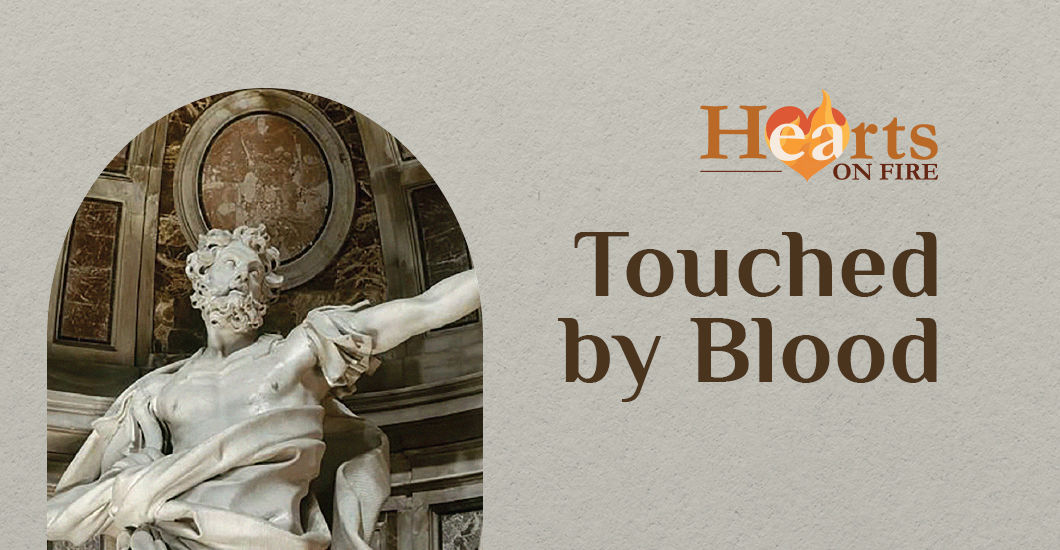
You might be familiar with the centurion who pierced the side of Jesus as the Lord hung on the Cross. According to some traditions and legends that soldier was named Longinus, a name that first surfaces in the apocryphal gospel of Nicodemus. The soldier is not named in the canonical gospels.
According to the legends, after enduring wounds in past battles, Longinus was cruelly mocked by his fellow soldiers for his near blindness. At the moment he pierced the Lord’s side, blood spattered onto his eyes. Immediately his sight was restored. In the Gospel of Saint Mark we hear him exclaim, “Indeed, this was the son of God!”
Tradition also tells us that Longinus left the army, took instruction from the apostles and became a monk in Cappadocia. There he was arrested for his faith, his teeth forced out and his tongue cut off. However, Longinus miraculously continued to speak clearly and managed to destroy several idols in the presence of the governor. The governor, who was blinded by the demons that escaped from the idols, had his sight miraculously restored by Longinus.
As Longinus was beheaded, some of his blood splattered onto the governors’ eyes and the governor was instantly healed. Saint Longinus is one of the first martyrs of the Church. His spear is one of the many relics associated with Christ and can be found in one of the four pillars over the main altar of St. Peter’s Basilica.
'
Can your brokenness bring great blessings?
Recently my husband and I had a school appointment to assess our 6 years old son Asher’s inattention and performance issues. The assessment went on for over two hours and included separate counselling and Q/A sessions for me and my husband. We badly needed the assessment to help us understand Asher’s challenges and help him improve and perform well in his activities.
I sat at the assessment centre with my daughter on my lap as my son played in a room filled with toys and puzzles. The assessor brought in questionnaires and began asking me questions. She asked about the family history, pregnancy complications, medications, challenges at home, Asher’s performance at home and school, difficulties he is facing, family support etc. She recorded all my responses.
After completing the questionnaires, and perhaps getting a glimpse of the depth of my emotional state, the counsellor said she couldn’t keep from asking me a very personal question – “How are you coping emotionally with all these challenges? What is the source of your strength?” I said that I have a faith in God and I believe He gives me strength to face each day.
I wondered how much sense that secret of my strength made to her. All she knew of me was that I was a complete mess—holding a four-year-old daughter in my lap who is almost in a vegetative state, another child struggling to fit himself into a world which doesn’t function the way he does, and me a clearly worn-out mom sitting in the assessment centre hoping they track my son’s uniqueness not just his flaws and give me some handy parenting tips to take home.
But to my surprise, the counsellor nodded her head with a smile and with tear-filled eyes she agreed with me about what I claimed to be my source of strength.
I thought my complicated life would disqualify me from sharing my faith in Jesus. But I have found that sharing my faith through my brokenness reveals Christs power in my life. As Saint Paul rightly says, His power is made perfect in our weakness (2 Corinthians 12:8).
Usually, we want to glorify God through our strength and successes and so we wait till things are running smoothly in our lives to give witness. But God also wants to use our brokenness for His glory. He wants us to share our faith right in the middle of our trials.
In his book “The Purpose Driven Life” Rick Warren shares words that give me great comfort: “Your weaknesses are not an accident. God deliberately allowed them in your life for the purpose of demonstrating His power through you. Other people are going to find healing in your wounds. Your greatest life messages and your most effective ministry will come out of your deepest hurts.”
If you find yourself in the middle of pain and in the midst of darkness, don’t waste those experiences. Use them to glorify God. Don’t wait till everything improves so you can say, See how I got through it! Consider letting God minister to others through your very chaos. Let His strength be manifested through your brokenness as you lean on Him for courage. The very thing you feel disqualifies you from sharing your faith can be the one thing that most clearly proclaims your faith and witnesses to God’s love. I hope my experience encourages you today.
'
My monastery runs a school, and last year, I was given the great honor of teaching Theology to seventh-graders. I had twenty-two of them for the last period of class every day of the week. Now, no teacher in his right mind would ever choose to teach any subject during the last period of the day, and seventh graders trump every other grade in the school for sheer excitability. So we invented a game called “Stump the Monk” which we would play for the last five minutes of class if the whole group was very, very good.
The best “monk-stumper” I ever heard came from a spunky, freckled little firebrand named Chad: “If Jesus loves us so much,” he said, “then why doesn’t he just come down and show himself to us?”
“Jesus does show himself to us,” I told him, “every time we receive the Eucharist.”
“Right. Right.” He answered with a sigh, “but what I’m asking is: Why doesn’t he personally, physically come down and visit us?”
“He does!” I replied, “In the Eucharist he personally, physically comes down and visits us.”
“That’s not what I mean,” he said, “I want to know why he doesn’t make personal, face-to-face appearances to people like me.”
“Well he does that too,” I said, “You just have to be patient.”
Chad wasn’t going to be put off that easily, I could tell. “So you’re telling me,” he said, “that you have personally, physically, met Jesus Christ face-to-face. You’ve seen him. You’ve personally seen God.”
I looked him in the eye and I said, “Yes, Chad, I have.”
“Fine!” he said, “Then what does he look like?”
There was a nervous silence in the classroom as he and the other students waited for my answer. And for a moment or two, I was a little afraid I was going to have to back down. But the answer came to me like a gift from heaven. “Chad,” I said, “I have met Jesus. Face to face. And you know what? He looks a lot like you.”
'
There’s something precious within you!
They say the only two sure things in life are death and taxes. But having spent my working life in the construction industry and having known people who made money dealing drugs, I can safely say the quote is only half true. Death surely does await us all, though most of us rarely think about it until we are forced to. We focus on our mortal, temporal bodies and forget about our eternal souls. But eternity is real and now is the time to decide where we want to spend it.
A few years ago, I had the privilege and blessing of volunteering with Mother Teresa’s Missionaries of Charity in a Calcutta (Kolkata), India home for the destitute, sick, and dying. Mother Teresa said, ‘A beautiful death is for people who have lived like animals to die like angels.’ I was blessed to experience such a death first-hand during my first visit to India.
I was staying with religious brothers on the night they received the news that Mother Teresa’s successor as superior of the Missionaries of Charity, Sister Nirmala, had died. The community was in mourning and as I prayed I felt the night sky change. It was as if Heaven was opening to receive this holy and faithful woman. Strangely, though, I felt the “opening” was not just for Sr. Nirmala, but also for someone else who would die soon. I felt in my spirit that someone in the home where I was volunteering would die the following day. I even wrote it in my journal. That night, I barely slept.
The following morning after attending Holy Mass and praying upon entering the home, I immediately went to the two most seriously ill men to make sure they were still living. Thankfully, they were. I set about my duties as usual. But soon one of the sisters took me by the arm and asked if I knew how to pray. I told her I did.
She took me to a man she believed had not long to live and asked me to pray with him. I sat at his bedside with my hand on his heart and began to pray. His eyes were staring at the ceiling and I sensed he had totally given up. He had lost so much weight that his face had grown gaunt and his cheeks hollow. His eyes were so sunken in that his tears pooled in the corners of his eyes and couldn’t run down his cheeks. My heart ached. As I prayed, I could see the hand I had placed on his chest moving up and down slower and slower with each successive breath. His life was slipping away. Upset, I began to ask God questions: Does this man have a family and if so, where are they? Why aren’t they here? Do they know what has become of this man? Do they care? Does anybody care?
Through my prayer, I began hearing drumbeats coming from the Hindu temple next door, a temple dedicated to the goddess Khali (the goddess of death). The drumbeat grew steadily louder. I sensed a battle raging for this man’s soul. When I saw him take his last breath, I closed my eyes and wept.
But when I opened them again, I suddenly found the answers to my questions. Unbeknown to me, two of the sisters, a brother, and another volunteer had also gathered around the deathbed. They stood silently in prayer. Did anybody care? Of course, they did! Where was his family? Right there praying for him–the family of God! I broke down in tears regretting how I had questioned God but also filled with awe and gratitude for His infinite goodness and mercy. I could not ask for anything more special at the hour of my own death than to be surrounded by people fervently and lovingly praying for my salvation. As I closed my eyes to pray again, I saw an image of the deceased man dressed in brilliant white, walking towards Jesus. Jesus’ arms were open wide as he waited for the man and then embraced him with great love. It was breathtakingly beautiful.
But God had more light to shine into my heart. With my hand still on the dead man’s chest, I opened my eyes and saw a man in a nearby bed who had soiled his pants. No one else had noticed him, so I had a decision to make: I could continue praying for a man who I now believed to be with Jesus or I could get up and help restore another man’s dignity. It was an easy choice. I stood up straight away and cleaned the bedridden man and put fresh clothes on him. What I heard silently in my heart was, ‘life goes on’.
Those who walk with Jesus know death is not to be feared. In fact, Christians, death should excite us: Paul says it persuasively: ‘For I am convinced that neither death nor life, neither angels nor demons, neither the present nor the future, nor any powers, neither height nor depth, nor anything else in all creation, will be able to separate us from the love of God that is in Christ Jesus our Lord’ (Romans 8:38-39).
Yes, life goes on, but for each of us it will also end one day. Our time here is short, and eternity is long’. So, with St. Paul let us forget ‘what lies behind and (instead) strain forward to what lies ahead and press on toward the goal of the upward call of God in Christ Jesus’ (Philippians 3:14).
'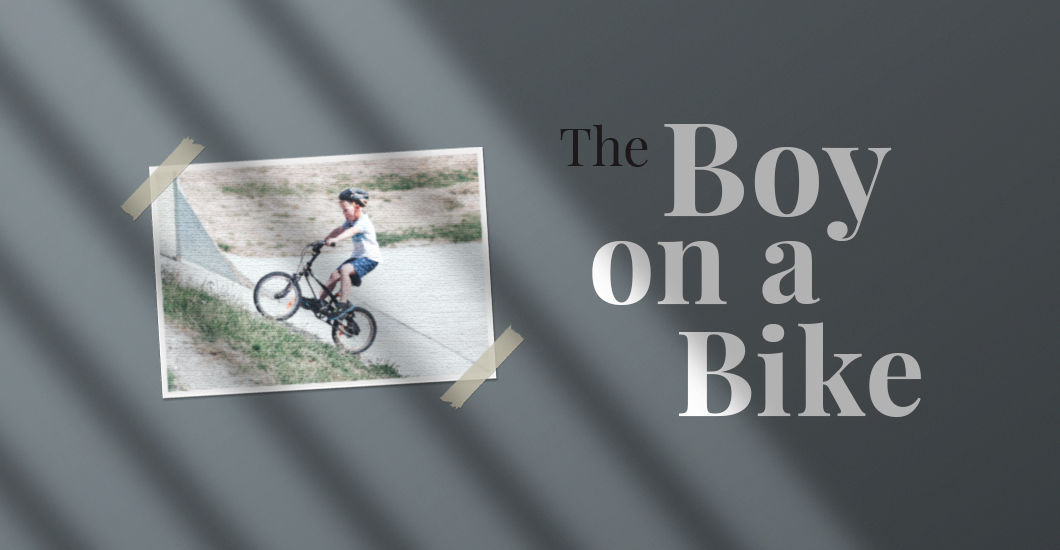
Grieving over loss of a loved one? Here is a mother’s heartfelt account of how she found hope
even in the darkest valley.
We were blessed with two sons. David the oldest had golden blonde hair. Our youngest son, Chris, had dark hair. David’s blonde hair would get even lighter during the summer months when he’d been out in the sun. Our boys were the joy of our lives.
When David was seventeen, life handed us a devastating blow. A catastrophic car accident killed him and a friend. Our hearts were shattered into a million and one pieces. We were in shock for weeks. Suddenly, our family of four was reduced to three as one was violently ripped from us. My husband and I and our 15-year old son, Chris, clung to each other, our friends, and our faith. Taking it one day at a time was even too much, I had to take it minute by minute and hour by hour. I thought the pain would never leave us.
Visiting David’s grave provided some relief from the deep sense of loss. I would visit his grave at least once a week. The cemetery in our small town is beautifully maintained. Lovely grass and trees enhance its quiet tranquillity. The road into the cemetery follows a circular path. You can see anyone leaving or entering from any vantage point.
One day, as I sat on the grass beside my son’s grave, the tears began to flow down my face. I was very concerned about his brother, Chris who was having a very difficult time coping with the loss of his only brother. After pouring out my heart, I wiped the tears from my eyes and looked around the cemetery. A young boy, in a white tank top with very blonde hair, was riding a bike around the cemetery. He rode his bike so smoothly and effortlessly that I was captivated. I idly wondered why a child might be riding a bike in a cemetery? For an instant, I glanced down at my son’s grave, then looked back, but the blonde boy on the bike had vanished before my eyes. I kept searching around for him, but he was gone. I sensed, from the depths of my soul, that it was my son, David. The white tank top the boy wore was identical to one David had worn all the time. It felt like David had visited me that day at the cemetery, to comfort me and let me know that he is at peace.
To this day, I cannot explain the encounter, but the memory is engraved on my heart forever by the Holy Spirit. I believe that God granted this heavenly encounter to assure me that I am not grieving alone. Jesus weeps with me and the Holy Spirit wipes away my tears, one day at a time. “God is our refuge and strength, an ever-present help in trouble.” Psalm 46:1.
After this mysterious encounter, my heavy burden lightened a little. Even though many years have passed since our David died, the sorrow of losing our child lingers in our hearts. Grief has no time limits. It lessens with time, but mothers and fathers mourn forever. I find comfort in the hope that we will see our precious son again one day.
When tragedy and death strike a family, everyone can become overwhelmed with grief. Processing loss is challenging, plunging us into deep, dark valleys; but God’s love and His amazing grace can infuse rays of sunshine and hope into our lives again.
“Though the mountains be shaken and the hills be removed, yet my unfailing love for you will not be shaken nor my covenant of peace be removed,” says the Lord, who has compassion on you.” Isaiah 54:10
'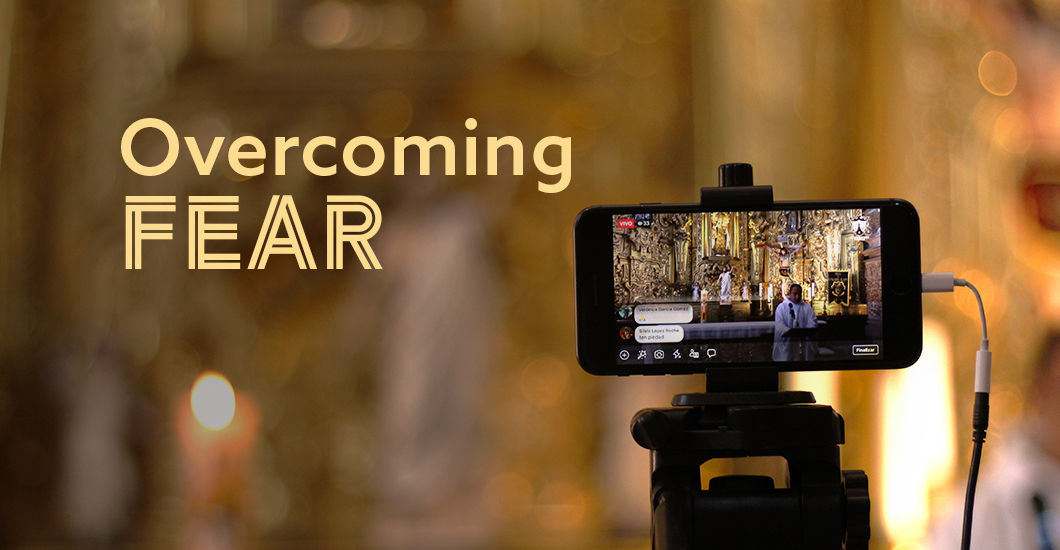
It’s time to fight your fears away…
It was yet another Covid Sunday when I was ‘attending’ an online Mass with my family. Even at the behest of COVID, I could see that the Holy Spirit continued to inspire us through online Masses and powerful homilies. Despite that, due to my own weaknesses, I could see that my attentiveness and devotion to the Holy Mass had greatly reduced over a period of time. As the Mass continued, the priest was giving the Holy Eucharist to the very few people able to attend the Mass in person. On one side, I was feeling sad that I could not receive the Holy Eucharist and on the other side, I was trying to justify that staying home was the most prudent thing to do.
My spouse was also ‘attending’ the online mass with me while taking care of the kids. She works in the medical field, so has a natural awareness of actions which are not meeting the standard COVID protocol. She noticed that the priest missed sanitizing his hands before he gave the Holy Eucharist to the few parishioners attending the Mass. After that I felt bad about passing judgment on others. Though I was convinced that attending Mass online was the right thing to do, I wanted to try going to Mass at the Church again. Despite the guilty feelings, I took courage and registered to attend Mass the next week. I doubted if it was a prudent decision at the time and had a hard time convincing my family.
Still beset by fear and anxiety, I set off for Mass the next Sunday. Despite a higher mortality rate for older people getting infected by COVID, almost all the people attending the Mass were old. I had no known health conditions and. despite being in my mid 30’s which is among the least affected age demographics for COVID, I was afraid to go to church. Sometimes I used to daydream about fearlessly standing up to proclaim my faith in Jesus Christ, like the early Christian Saints who were persecuted for doing so. Now at the smallest test of my faith, I had failed miserably.
I remembered all the days when I went out to buy groceries and other things which I had considered more essential than my spiritual food. I recalled my own assertion that Jesus Christ was truly present in the Holy Eucharist and many conversations about the Eucharistic miracles. But for many months, I had feared going to church to receive the Holy Eucharist and passed judgmental thoughts on the priest and others. God made me aware of how cowardly I was. My former words rang hollow and I lamented my failure to support my convictions with my actions.
I realized that despite being at home for close to a year, I was not getting any time for personal prayer and I my family’s prayer life had considerably reduced. We were fully engaged with work and household activities, while television and streaming services took up any free time remaining.
I thought back to the days before COVID changed our lives. My prayer life was much better and I felt more motivated to live a holy life because I wanted to receive the Holy Eucharist whenever I went to Mass. I realized that my own holiness and prayer life was dependent on attending Mass and receiving the Holy Eucharist. Luke 17:33 kept coming to my mind,
Whoever tries to keep their life will lose it, and whoever loses their life will preserve it.
Because I am weaker than others, I have come to understand that my eternal life is very much dependent on attending Holy Mass and receiving the Lord in the Holy Eucharist as much as possible. Receiving the Holy Eucharist that day was very special, as I had been missing my spiritual food for such a long time. I still have my own little fears about COVID, especially because of any harm that I could cause to my family, but I am starting to put my faith in action by trusting our all powerful, merciful, understanding God and receiving my spiritual food at least every week.
'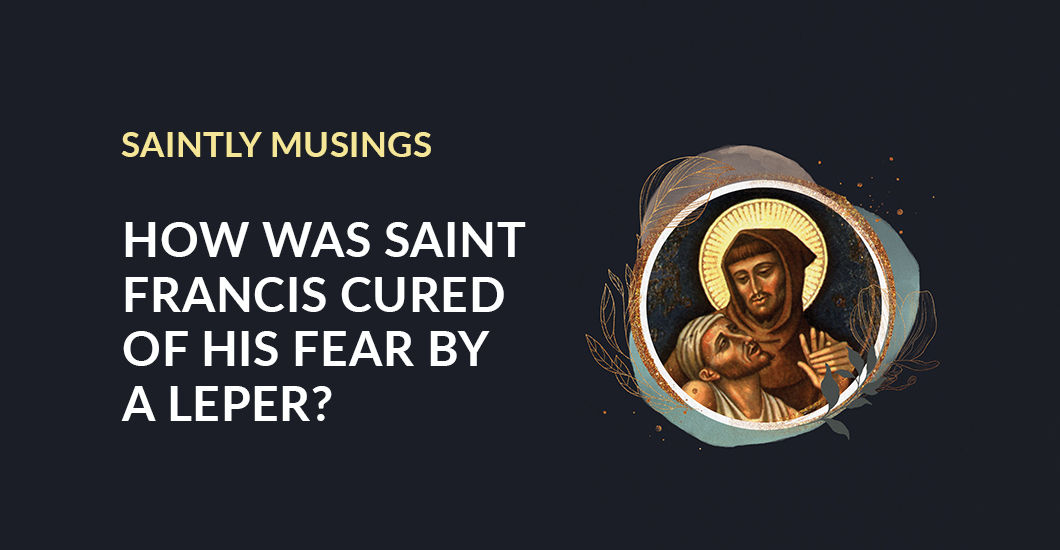
Saint Francis of Assisi once had a great fear and abhorrence of lepers. He confessed that the sight of a leper was so repugnant to him that he refused to even approach their dwellings. If he chanced to glimpse one in his travels or pass by the leprosarium, he turned his head away and blocked his nose.
As he became more serious about his faith and took on Christ’s admonition to love others as you love yourself, he became ashamed of this attitude. So one day when a man afflicted with leprosy crossed his path, he overcame his feelings of horror and disgust and, instead of turning away, leaped off his horse, kissed the leper and pressed money into his hand.
But when Francis remounted and looked back, he could not find the leper anywhere. With dawning excitement, he realized that it was Jesus whom he had kissed. After gathering some funds, he went to the leper hospital and gave alms to each one, kissing their hands with reverence as he did so. What had formerly seemed distasteful to him—the sight or touch of a leper—was transformed into sweetness. Later Francis wrote, “When I was in sin, the sight of lepers nauseated me beyond measure; but then God Himself led me into their company, and I had pity on them. When I became acquainted with them, what had previously nauseated me became the source of spiritual and physical consolation for me.”
Today, we often see people around us who are stricken with spiritual leprosy. Mostly we try to keep away from them, but we fail to realize that it has crept into our own hearts as well. So instead of judging and pointing fingers at others, let’s cleanse ourselves off the crippling mind and hardness of heart. In the first place, God bestowed His grace and mercy upon us though we are broken and wounded. Let’s reach out to others with this mercy and compassion which we received unconditionally.
'
Q – It grieves my heart to see so much division in the world. Whether it is divisions between races, political animosity, and even rifts within the Church, there seems to be nothing but hatred, division, and anger in our culture today. As a Catholic, how can I do my part to bring healing to our world which is so divided?
A – Ever since Cain and Abel, division and hatred has been a primary tool of the Evil One. Today, through social media and with the issues that people feel strongly about, I believe we are experiencing an unprecedented time of animosity within our world. But our Catholic Faith can show us a better way!
First, we must recall the fundamental truth that every human being is made in God’s image—including our enemies. As Mother Teresa once said, “We have forgotten that we belong to one another.” The person of a different race or political persuasion, that person we are arguing with on Facebook or who is standing on the opposite side of the picket line, is a beloved child of God whom Jesus died for. It’s easy for us to label people and dismiss them—we say, “Oh, he’s just so ignorant for believing X” or “She’s so evil for endorsing candidate Y”—but this dismisses their great dignity. Our opponents have the potential to become saints, and are recipients of God’s mercy and love, just like we are.
One of the great errors of the modern world says that in order to love someone, we must always agree with them. This is absolutely false! We can love people who have different political persuasions, sexual orientations, theological standpoints. In fact, we must love them. It is far more important to win a soul to Christ than it is to win an argument, and the only way to win a soul is through love. As Pope St. John Paul II once said, “The only proper response to a human being is love.”
Love of our opponents takes many forms. We try to do concrete works of mercy for them—so if we see them thirsty because they are protesting on a hot summer’s day, we offer them water, even if we don’t agree with their message. We make sure that our dialogue with them is respectful and sticks to the issues, rather than devolving into a name-calling session (especially when we respond to them online). We pray for them—for their conversion, for their deeper healing, for their sanctification, and for material blessings. We genuinely seek to understand their position, rather than just dismissing it. Even people who believe errors have common ground with us—seek out that common ground, affirm it, and build on it to lead them to the truth. And sometimes that love can best be shown by offering them the truth of Christ in a loving way. Also, we should be humble enough to recognize that sometimes we are the ones in the wrong, and we need to be taught by others’ insights and experience.
Finally, I think it is important to avoid websites and news articles that are purposely inflammatory. Many news outlets and social media sites make their living by stirring up outrage and anger. But God desires Christians to be filled with peace and love! So avoid those websites or articles or authors who simply try to stir up controversy for the sake of ratings or website clicks.
St. Paul in Romans 12 gives us a good admonition: “Do not repay anyone evil for evil. If it is possible, as far as it depends on you, live at peace with everyone. If your enemy is hungry, feed him; if he is thirsty, give him something to drink. In doing this, you will heap burning coals on his head. Do not be overcome by evil, but overcome evil with good.”
Only true Christian charity, carried out in words and deeds, will heal the divisions in our culture and our world.
'